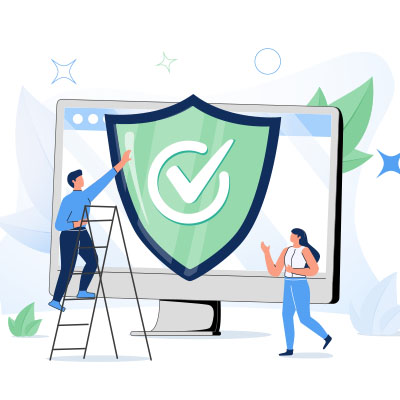Is Free Antivirus Good Enough?

If you are old enough to remember when antivirus (like most computer software) came in a great big textbook-sized box at the store, then you probably remember a time when that was the only protection you really needed.
Today, there are countless free versions of antivirus out there. Let’s talk about how much protection these actually bring, and when and where they might be a good fit.
With Free Antivirus, Do You Get What You Pay For?
Well, yes and no.
First, any software developer can claim to make antivirus software. Malware is often disguised as “free antivirus” or “free Internet security software.” These rogue applications are distributed online, usually through obnoxious or tricky ads that make you think your computer is infected. Sometimes they will even look like real antivirus brands like AVG and Norton, or they will name-drop Microsoft Windows to try to look more legitimate. Services like these only do harm.
That being said, there are legitimate antivirus solutions that are free, or at least start out free, or offer a limited set of features for free. These security solutions are made by cybersecurity firms that contribute a lot more than just software—most reputable cybersecurity firms that offer their own antivirus are also doing heavy R&D and investigative work in the world of infosec to stay on the bleeding edge of protection.
These companies, in no particular order, include Acronis, Avast, AVG, Bitdefender, Eset, Kaspersky, Microsoft, Norton, Trend Micro, SentinelOne, and Sophos.
Some of these companies have free versions of their antivirus software, and while each solution might have its pros and cons, generally the antivirus software is going to do what it’s supposed to: scan files that attempt to enter your device to attempt to prevent malware.
A free antivirus application works pretty well at its one singular job, provided that the user keeps it updated.
However, free antivirus solutions don’t include some of the extra features that make the paid versions worth the money, such as phishing protection and active monitoring.
On top of that, free antivirus software tends to get pretty aggressive about having you pay for it. In the best-case scenario, this is a little annoying, but it can also interrupt what you are doing with popup ads and notifications.
When is Free Antivirus a Good Fit for My Computer or Laptop?
If you are just trying to protect a personal computer that doesn’t have a lot of sensitive data on it, or maybe a family’s home computer, or the travel laptop you keep Netflix on for the kids in the car, then a reputable free antivirus solution is probably going to be good enough. If you can swing it, getting a premium tier of antivirus will offer more protection, and is always recommended, but it really depends on the type of stuff you do with the device.
Once you are storing sensitive information on it, or doing online banking, or any sort of business, then you’ll want to upgrade to more powerful protection.
Businesses will want to steer clear of free antivirus software and even avoid premium consumer-based solutions. Instead, your organization should have a centrally managed antivirus that is deployed outwards to all of the devices on your network.
This means that every device on your network has proper protections in place, and the centralized system will keep virus definitions updated, as well as run additional security services to prevent threats beyond just viruses and malware.
Your Organization Needs Comprehensive Cybersecurity
Unfortunately, gone are the days when antivirus is enough protection. While antivirus plays a critical role in preventing some cyber threats, your organization needs additional layers of protection for other types of threats and scams. This includes active threat monitoring, firewalls, data encryption, phishing prevention, and employee cybersecurity training.
We can help your business meet compliance standards all while protecting your business. To get started, give us a call at (603) 889-0800.


